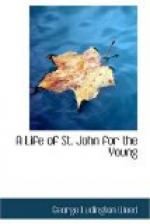“O Saviour, gone to God’s
right hand,
Yet the same Saviour still,
Graved on Thy heart is this lovely strand,
And every fragrant hill.”
At the period of which we speak the region was full of people. Nine large towns, each containing fifteen thousand inhabitants, bordered on the lake. Numerous populous villages lined the shores, or nestled in the neighboring valleys, or were perched on the hilltops. Fishermen’s huts—which were mere stone sheds—fringed the lake. They stood in every rift of rock, and on every knoll, with their little cornfields and vine ledges extending to the sandy beach.
[Illustration: SITE OF BETHSAIDA From Photograph Page 23]
On the seashore, among the chief buildings, were palaces for Roman princes, and quarters for Roman soldiers. The waters were covered with boats for pleasure, merchandise and fishing. Four thousand floated at one time on the narrow lake. Vast quantities of fish were caught in the waters, supplying not only the people of Galilee, but the populous city of Jerusalem, especially when crowded with pilgrims; and were even sent to distant ports of the Mediterranean. We shall see John’s interest in such labors.
On the north-western shore of Gennesaret is a beautiful bay sheltered by hills and projecting cliffs. The sight is such as would be a fisherman’s delight—a little haven from storm, with a broad beach of sand on which to moor his boats. There is no place like it in the region of Galilee. Close to the water’s edge, it is supposed, was the town of Bethsaida, probably meaning House of Fish.
CHAPTER II
Five Boys of Bethsaida—Rambles About Home
“Walking by the
Sea of Galilee, He saw two brethren, Simon who is
called Peter, and Andrew
his brother.”—Matt. iv. 18.
“And going on
from thence, He saw other two brethren, James the son
of Zebedee, and John
his brother.”—v. 21.
“Philip was from
Bethsaida, of the city of Andrew and
Peter.”—John
i. 44.
Bethsaida was honored as being the home of five of the Apostles of Jesus. We know nothing definitely concerning them until their manhood. We wish we knew of their childhood. It is only because of their relation to Jesus that they have been remembered. Had it not been for this they would, like many other boys of Galilee, have lived on the shores of Gennesaret, fished in its waters, died, and been forgotten. These five Bethsaidan boys were two pairs of brothers and a friend. The names of one pair were Andrew and Peter. They were the sons of Jonas, a fisherman. As they grew up they were engaged with him in casting the net and gathering fish, by day or by night, and thus securing a livelihood without thought of change of occupation. It was a Jewish custom for boys to learn a trade or business, which was generally that of their fathers.




